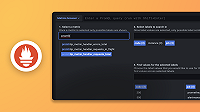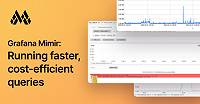Important: This documentation is about an older version. It's relevant only to the release noted, many of the features and functions have been updated or replaced. Please view the current version.
Configure out-of-order samples ingestion
If you have out-of-order samples, due to the nature of your architecture or the system that you are observing, then you can configure Grafana Mimir to set an out-of-order time-window threshold for how old samples can be ingested.
As an experimental feature, Mimir allows you to ingest out-of-order samples. As a result, no sample is dropped if it is within the configured time window.
Configure out-of-order samples ingestion instance-wide
To configure Mimir to accept out-of-order samples, see the following configuration snippet:
limits:
# Allow ingestion of out-of-order samples up to 5 minutes since the latest received sample for the series.
out_of_order_time_window: 5mConfigure out-of-order samples per tenant
If your Mimir has multitenancy enabled, you can still use the preceding method to set a default out-of-order time window threshold for all tenants. If a particular tenant needs a custom threshold, you can use the runtime configuration to set a per-tenant override.
- Enable runtime configuration.
- Add an override for the tenant that needs a custom out-of-order time window:
overrides:
tenant1:
out_of_order_time_window: 2h
tenant2:
out_of_order_time_window: 30mSetting out_of_order_time_window to 0s disables the out-of-order ingestion while you can still continue to query the out-of-order samples ingested till now.
Query caching with out-of-order ingestion enabled
Once a query has been cached, out-of-order samples that get ingested later can potentially change those query results.
To help with that, we recommended you to pass the same limits config to the query-frontend component.
It will set a lower TTL (Time-To-Live) of 10 minutes for any query cache entry that falls within the ingestion window for out-of-order samples (i.e. timestamps after now minus out_of_order_time_window).
If you do not want to cache any query for this window at all, you can set -query-frontend.max-cache-freshness to match the out_of_order_time_window so that you don’t cache queries
for the time window where you still expect samples to arrive. Doing so can increase the load on your Mimir cluster depending on query characteristics.
Recording rules when out-of-order ingestion is enabled
Similar to the problem above with query caching, the samples recorded via the recording rules can get outdated with new out-of-order samples being ingested. So you should expect some difference in results if you happen to run the raw query of the recording rule. The difference highly depends on your out-of-order ingestion pattern.
If you happen to have a shorter out_of_order_time_window, say less than 10 minutes, then you can use -ruler.evaluation-delay-duration to delay your rule evaluation up to that time.
Understand out-of-order
Previously, Mimir and Prometheus TSDB had a couple of rules over what timestamps are accepted.
The moment that a new series sample arrives, Mimir needs to determine if the series already exists, and whether or not the sample is too old:
- If the series exists within the Head block of the TSDB, the incoming sample must have a newer timestamp than the latest sample that is stored for the series. Otherwise, the ingesters consider it to be out-of-order.
- If the series does not exist, then the sample has to be within bounds, which go back 1 hour from TSDB’s head-block max time (when using 2 hour block range). If it fails to be within bounds, then the ingesters consider it to be out-of-bounds.
The experimental out-of-order ingestion helps fix both the issues.
Note: If you’re writing metrics using Prometheus remote write or the Grafana Agent, then out-of-order samples are unexpected. Prometheus and Grafana Agent guarantee that samples are written in-order for the same series.


